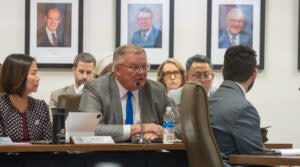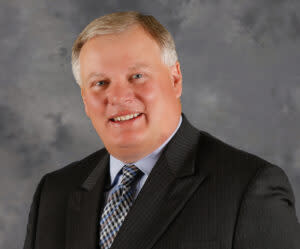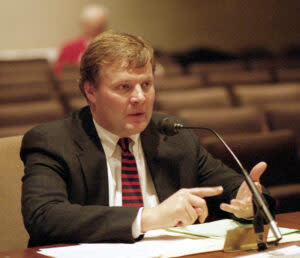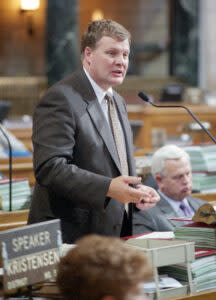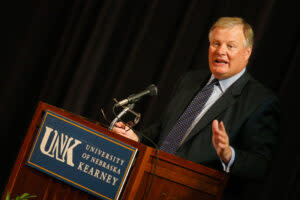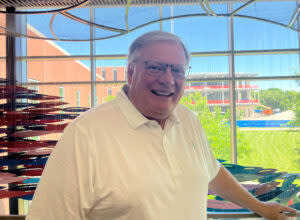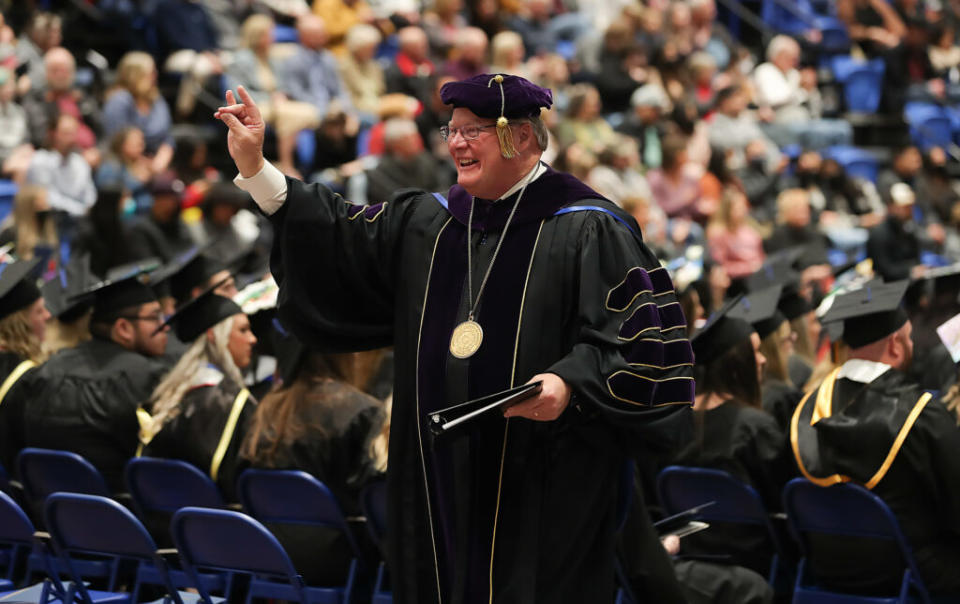Retired UNK chancellor reflects on 42 years of public service as ‘living proof’ of NU mission
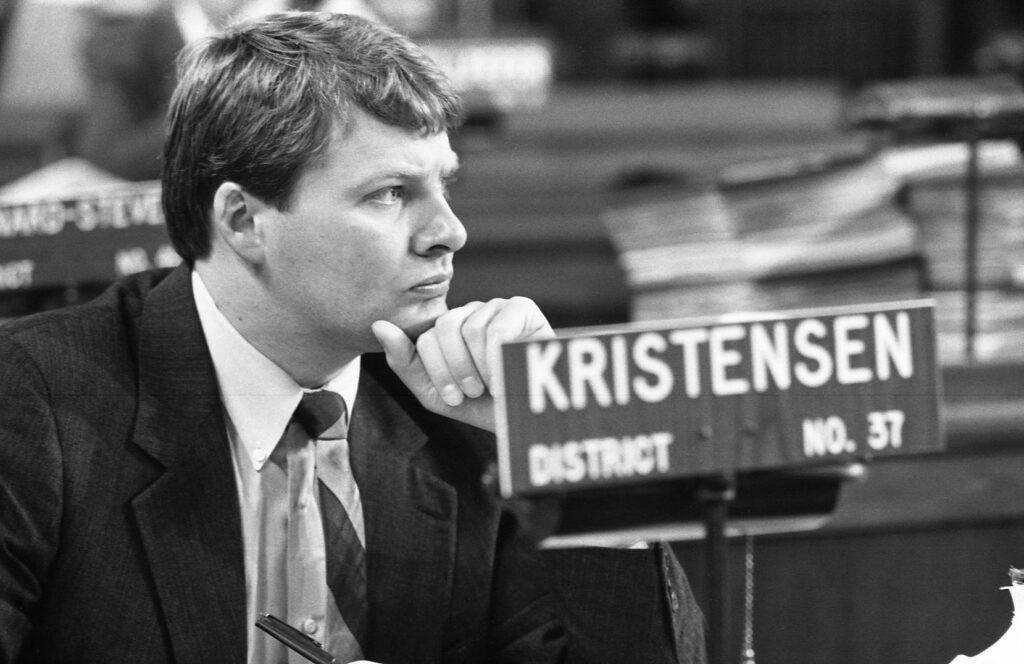
Retired University of Nebraska at Kearney Chancellor Doug Kristensen served as a senator senator from Minden for 14 years, from 1989-2002. He was the longest serving speaker when he was appointed and left to lead UNK in 2002. (Courtesy of UNK Communications.)
KEARNEY — University of Nebraska at Kearney Chancellor Doug Kristensen retired May 31 after four decades of public service that he said represents “living proof” of NU’s mission.
Kristensen left UNK after 22 years at the post, a capstone to his career that included nearly 14 years in the Nebraska Legislature and six years as Kearney County Attorney. He hasn’t determined what lies ahead — officiating golf tourneys could be one past time — but he looks back fondly on a career that elevated focus on rural health, tax equalization, court of appeals and residential education.
“I’m a Nebraska kid who got to be involved in the two most important things in the state,” Kristensen said, pointing to the Legislature and NU. “Are you kidding me? I got to do that.”
‘The pendulum will swing’
Kristensen has said NU might be one of the most important institutions for how it daily impacts residents, including through his own education. He said critics who have doubted the value of higher education “will come to their senses.”
“The pendulum will swing and there will be a need again to go, ‘Oh my God, we’ve got to highly train people to keep them here because the jobs are going to demand it,’” Kristensen said.
Under his tenure, Kristensen said UNK matured to value what it had, instead of what it didn’t. This included $360 million in investments to improve every campus building and an additional $100 million for the adjacent educational, residential and commercial University Village.
“We can’t be Lincoln, but you know what, they can’t be us,” Kristensen said. “So let’s take and run with what we have and what we do well, and that’s take care of undergraduate students.”
Kristensen said NU leaders should put aside headlines and not compare themselves to coastal colleges. Instead, they should talk about quality and strengthen each campus identity.
He pointed to four-year graduation rates as an example that looks good on paper. However, the rates might not account for the benefit some students might receive with more time in the classroom, such as teachers who could earn another endorsement in one semester or year.
“That’s really what the taxpayers, I think, want,” Kristensen said. “They don’t want headlines, they want results. They want effectiveness.”
From farm to college
The Minden native said his path to 42 years of public service began simply by learning a love for reading from his mother at a time when college was a question of when, not if.
Growing up, Kristensen’s mother would bring him U.S. News and World Report and other news magazines, such as TIME, which interested him in current events. At night, he’d listen to Walter Cronkite, who would talk about the Vietnam War and campus unrest.
“All of those were really upheaval times and people today forget that we’ve had upheaval before, and the country survived,” Kristensen said.
Kristensen soon became interested in political science questions of “What made the place tick?” and “Why?” and found a fit at the University of Nebraska-Lincoln. It was as far away as he could go, he said, as the ideas of his father, farming and college “probably didn’t fit together.”
“I went into political science because it was interesting and informative. Could I see myself doing something in public service? Sure. But running for office was not one of them,” Kristensen said. “That’s probably the old farm kid in me that nobody would vote for me anyway.”
Kristensen graduated with degrees in economics and political science and completed his law degree between Drake University in Iowa and NU.
It was during his legal education he got his first brush with the Nebraska Legislature as a Judiciary Committee intern, sitting in in the same room as State Sen. Ernie Chambers who he would one day be elected to serve with.
‘The itch of public service’
Kristensen started at a firm with 43 lawyers in Carroll, Iowa, a city of 10,000 residents, and would unsuspectingly be asked to return to Nebraska while driving a friend back to Red Cloud, Nebraska, around Easter.
His friend’s father, a district judge, encouraged Kristensen to return and practice law. He said he would find Kristensen a partner. Two weeks later, Kristensen got the call to return.
“I came back to the place I swore I’d never go,” Kristensen said.
In need of money for his law practice, Kristensen broke the “old farm kid” thought that no one would vote for him. He ran and was elected as Kearney County Attorney in 1982. While in office, multiple county attorneys sought to change the law after a murder trial ended in acquittal. It was Kristensen who testified before the Judiciary Committee as part of that effort.
In 1988, Kristensen challenged incumbent State Sen. Jerry Miller, and voters chose Kristensen as their new representative that fall.
“I figured I’d be there for four years, come back home and practice law — I scratched the itch of public service,” Kristensen said.
‘Every vote means something’
Yet Kristensen stayed for nearly 14 years, finding a seat next to State Sen. Jerry Warner who he would work with in 1989 to bring UNK into the NU system. That effort was ultimately successful two years later, following legal challenges.
“Next to my parents, I learned the most about life and the Legislature from Jerry Warner,” Kristensen said. “I wish I’d written everything down the man’s ever uttered to me.”
In addition to Jerry Warner, his father, Charles Warner, had served in the Legislature before the Unicameral was even formed in 1937. In 1903, it was Charles Warner who ushered legislation for the “Nebraska State Normal School at Kearney,” which opened in 1905 and would later be renamed the Kearney State College in 1963.
Kristensen said he learned many things in his early legislative career, which appeared first as subtleties:
Learn before you lead.
Before you change a law, understand why the law is the way it is.
Don’t talk on every bill and don’t strive to talk first — talking isn’t required to win.
Above all, learn how to count votes.
“Every vote means something, even the vote to go to lunch, because there are those that want to stop or those that want to go,” Kristensen said. “You want to begin to read the body, to read the collective feeling the body may not know, but where do they want to go?”
Legislative achievements and leadership
Early on, Kristensen was elected chair of the Legislature’s Transportation and Telecommunications Committee.
He helped to protect the Highway Trust Fund and passed legislation to establish the Tax Equalization and Review Commission, Courts of Appeals, Commission on Public Advocacy and rewrote business entity laws. With the help of legislative staff, the Transportation Committee led a rewrite of the Nebraska Rules of the Road and implemented telephone deregulation.
In 1998, after State Sen. Ron Withem left the speaker’s office, Kristensen put his name in the hat and won 26-21, his workload tripling just as it had when he first became a committee chair.
Longtime Clerk of the Legislature Patrick O’Donnell, who stepped down in 2022, said in a farewell video to Kristensen that he couldn’t say enough good things. Describing Kristensen as a strategic thinker, O’Donnell said he helped manage the 49 men and women who each had egos and agendas “about as masterfully as anyone I ever worked with.”
“I’d be hard pressed to think of someone who has had quite as accomplished of a career as Doug Kristensen,” O’Donnell said in the video. “Both UNK and the Nebraska Legislature are better places because he was here.”
Kristensen said term limits were part of the reason he applied to be UNK chancellor, a position to which he was appointed in mid-2002. He left as the longest serving speaker at the time.
‘Healthier Nebraska’ origins
In his next 22 years, Kristensen left a mark on rural health education in a collaboration with the University of Nebraska Medical Center. One such chapter came in 2011 when top NU officials and campus leaders met to eliminate or reduce costs, and UNK was partnered with UNMC.
“It’s like the prince and the pauper,” Kristensen said. “That discussion didn’t last very long about what we could do together to save money. What did last long was a discussion about what we could do together.”
Kristensen saw a chance for state investment through the Legislature’s “rainy day” funds.
“Why don’t we think bigger? We can build a whole new building,” Kristensen told then-academic vice chancellor Charlie Bicak, who is now interim UNK chancellor.
Kristensen went to then-UNMC Chancellor Hal Maurer, who Kristensen said first interpreted the idea as a competing building — ”he asked me to leave his office, basically threw me out.”
But with help from then-NU President J.B. Milliken, Kristensen and Bicak marched ahead.
“My point was that money’s going to get spent, we need to go now,” Kristensen said. “Charlie and I spent Christmas break literally writing on napkins, coming in when the heat was off.”
The ink soon became “Healthier Nebraska,” which went before the Legislature in 2012 as a $115 million project for a Veterinary Diagnostic Center at UNL, a new building for nursing and allied health professions at UNK and a cancer research tower at UNMC.
The “theme” was part of the former speaker’s strategy to get Lincoln and Omaha votes, confident he had ones from rural Nebraska. It became “a great marriage.”
“We knew it was going to work because if you train people in rural Nebraska they’ll stay here,” Kristensen said.
The next rural health chapter
A decade later, UNMC and UNK continue to expand rural health education. UNMC Chancellor Jeffrey Gold, the NU president-elect, attributes that to Kristensen.
“His partnership in building the future for health care in rural Nebraska, as an exemplar to the rest of the nation, is unparalleled, and credit really goes to him for all of that which has happened and all of that which will happen in the future,” Gold said at an April regents meeting.
Bill and Ruth Scott, who have been major financial supporters for the UNK-UNMC partnership, requested that UNK’s rural health facilities be housed on the “Douglas A. Kristensen Rural Health Education Complex.” Bill Scott, prior to his death this year, had named it “The Doug.”
The complex includes a building that opened in 2015 and a 110,000-square-foot building, which began construction this spring and will bring all UNMC colleges to UNK.
It will be the largest rural health education center in the country.
“I think we are exactly what the founding fathers of Nebraska envisioned when they began to start schools of higher education,” Kristensen said.
‘I’m living proof’ of NU mission
Regent Rob Schafer, board chair, said Kristensen’s retirement marked “the end of an era” with a man who gave his time to NU, which is “probably our most precious commodity.”
Said Schafer: “At the end of the day, if we had a billboard in Nebraska that wanted to reveal what servant leadership would be, you’d have to have Doug Kristensen’s face on it.”
Kristensen has vowed not to remain idle in his retirement, looking to embrace his recent certification as an executive PGA golf official and continue to uplift rural health initiatives.
“I’m a product of what I think the university does, and that’s educate their children and allow them to serve in the state. I’m living proof of that.”
The post Retired UNK chancellor reflects on 42 years of public service as ‘living proof’ of NU mission appeared first on Nebraska Examiner.

